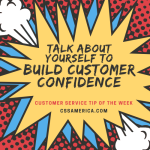Assuming something is rarely a wise course of action. If you’re a manager, you know how to manage. If you’re in a leadership position, you have great leadership attributes. If you serve the public, you are great at customer service.
For anyone who’s known bad managers, bad leaders, or people in government who are poor in customer service, you know why those assumptions are wrong.
The new Superintendent of the San Diego Unified School District understands the need to avoid those assumptions, as well. In the article Will “High-Quality Customer Service” For San Diego Principals Mean High-Quality Schools?, Cindy Marten (the new Superintendent) views her role as one of supporting principals, and part of that support involves viewing principals as customers. Marten notes “We’re providing high-quality customer service for our principals, and the reason why we’re doing that on behalf of the principals is that we expect high quality service for our principals to have with their teachers and with the community members, and you can’t deliver high-quality customer service by yourself — you’re not an island.”
In any business, before you change behaviors, you have to set expectations with staff about what are those desired behaviors. Marten is setting expectations with central office staff that they view and treat the principals and schools as customers – being proactive and responsive to needs. The thinking is two-fold: First, help the central office staff to see that they’re impacting student success by impacting the schools’ success. Second, help principals to realize that the high level of customer service provided to them by the central office should be mirrored by the principals in interactions with the parents and teachers.
The statement “you’re not an island” is one we’ve used a lot in our client conversations. Don’t feel like you have the entire weight of the world on your shoulders when addressing a customer’s needs – tap into others. But also realize that others are impacted by your actions, others are stakeholders in your encounters and decisions; so think about the downstream effects to co-workers and customers of what you do today.
When you want to change a culture to be more customer-focused, start by setting the right expectations of staff in their dealings with each other.
Did you like this post? Here are other K-12 education-related posts:
Learn about our CSS Education services at: http://cssamerica.com/cssed.htm











